Professorship Challenge Fund set into motion
Harvard donors aim to increase faculty resources across University
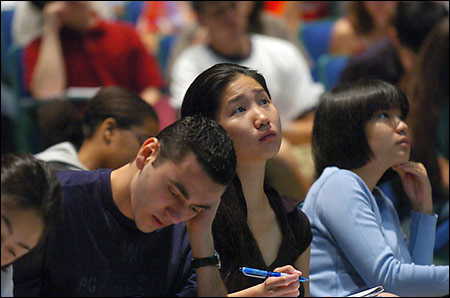
Harvard donors aim to increase faculty resources across University
Harvard University announced today (Feb. 16) the establishment of a $50 million Professorship Challenge Fund. The group of generous donors who created the fund hopes to encourage gifts from alumni and friends to endow named professorships across the University and provide other critically needed faculty support.
Donors making gifts of $3 million will be matched with $1 million from the Challenge Fund to fully endow a named professorship. Individuals interested in establishing a faculty development fund with a gift of $1.5 million will receive a match of $500,000. The Professorship Challenge Fund has been created through the leadership of Charles J. Egan Jr. ’54 and Mary Bowersox Egan R’55 and the Stanley H. Durwood Foundation; Alphonse Fletcher Jr. ’87; J. Christopher Flowers ’79 and Mary H. White; James F. ’68, M.B.A. ’70 and Anne Fitzpatrick Rothenberg; Brian D. ’76 and Anne T. Young; and an anonymous donor.
“The University makes no investment more important than building and supporting an outstanding faculty,” said President Lawrence H. Summers. “We are grateful to these donors for establishing the challenge, which is critical to realizing Harvard’s mission.”
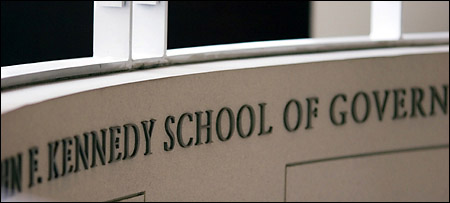
Investing in Harvard’s faculty
Harvard’s reputation as a pre-eminent academic community stems largely from the quality of its faculty and students, and their accomplishments draw other talented individuals to the University. To date, Harvard faculty have received 43 Nobel Prizes, more than 40 Pulitzer Prizes, and some 50 MacArthur Foundation Fellowships.
As many of Harvard’s Schools increase the size of their faculties to meet their teaching and research goals, additional named chairs will honor and help to retain outstanding scholars currently in place, while also attracting talented newcomers in burgeoning fields. Faculty development funds will provide money for a variety of initiatives, such as laboratory setup for science faculty and funds to give nontenured faculty the support they need to compete for tenure at Harvard.
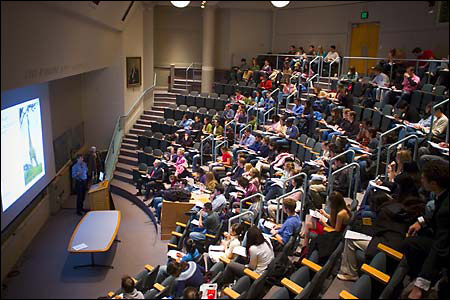
University-wide effort
The Professorship Challenge Fund will benefit the Faculty of Arts and Sciences (FAS), Harvard Medical School (HMS), Harvard Divinity School, the Harvard School of Dental Medicine, the Graduate School of Education, the Harvard School of Public Health, the Graduate School of Design, and the Kennedy School of Government.
“We can equal the best small colleges in teaching and inspiration,” said William C. Kirby, dean of the Faculty of Arts and Sciences and Edith and Benjamin Geisinger Professor of History, “and surpass them all by virtue of being at the heart of a great research university.” The FAS wants to continue growing the faculty and increasing student-faculty interaction, while adding chairs in areas where prominent senior members are not already distinguished with the prestige of a named chair.
“Endowed chairs play a critical role in our recruiting and retaining faculty leaders,” said Joseph B. Martin, dean of the Faculty of Medicine and Caroline Shields Walker Professor of Neurobiology and Clinical Neuroscience. “They allow us to honor and support individuals who are outstanding in their respective fields.”
HMS researchers are engaged in leading-edge research efforts ranging from using new microscopy techniques to detect the individual neuron activity in the brains of animals to taking snapshots of single cells responding to external agents such as drugs and toxins. HMS will use additional named professorships to honor faculty achievement, fund teaching and research, and foster excellence in uncertain economic times.
Faculty at the John F. Kennedy School of Government thrive within the fast-moving landscape of public inquiry. The unique opportunity to support these scholars will offer the satisfaction of having an impact in the wider world. “Faculty are at the heart of both the teaching and idea-generating mission of the School,” said David T. Ellwood, dean of the Kennedy School and Scott M. Black Professor of Political Economy. “Our goal is to find faculty whose work is so powerful, serious, and significant that it will help reshape the thinking of those seeking solutions to the most vexing public interest issues.” Ellwood is particularly interested in adding new chairs that focus on crosscutting public policy challenges in the United States and a variety of regions around the world, as well as faculty members who specialize in democratic institutions and politics, and public management and leadership.
Thomas F. Kelly, the Morton B. Knafel Professor of Music in the Faculty of Arts and Sciences, summarized the vital importance of the challenge from a faculty perspective: “Those appointed to named professorships at Harvard University consist of people whose scholarship ranks at the highest level and who remain interested in all aspects of their work. They epitomize the passion to learn and to share their knowledge with others.”
Charles J. Egan Jr. and Mary Bowersox Egan and the Stanley H. Durwood Foundation
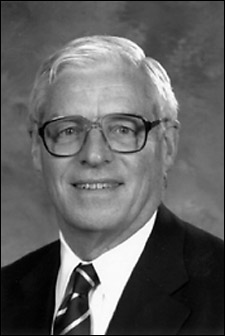
Since graduating from the College in 1954, Egan has maintained a continuing interest in the University. In addition to his task force membership, he has served on the Committee on University Resources (COUR) since 1986, and is a member of the Faculty of Arts and Sciences Boston and New York Major Gifts Committees. He recently completed a three-year term as co-chair of the Harvard College Fund Council, and served as co-chair for his 50th reunion. He is also a past president of the Harvard Alumni Association.
Egan became of counsel to the Kansas City law firm of Blackwell Sanders Peper Martin LLP on his retirement as vice president and general counsel of Hallmark Cards, Inc. after some 30 years of service. He has also been on the board of AMC Entertainment since 1986 and currently is a trustee of the Kansas City Art Institute and co-trustee of the Stanley H. Durwood Foundation.
Mary Egan is a member of Radcliffe’s Class of 1955. She has concentrated much of her attention on raising the Egans’ four children. She is also a longtime supporter of the Arthur and Elizabeth Schlesinger Library on the History of Women in America at the Radcliffe Institute for Advanced Study. She was active in Schools and Scholarships Committee work in Kansas City and Long Island.
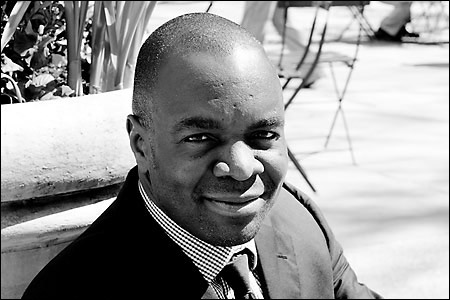
Alphonse Fletcher Jr.
One of three brothers to attend Harvard, Alphonse Fletcher ’87 was brought up by Alphonse Fletcher Sr. and Bettye R. Fletcher, parents who emphasized the crucial role of education in personal development. Inspired by his experience at Harvard, Fletcher established the Alphonse Fletcher University Professorship in 1996, and he now enthusiastically supports the Professorship Challenge Fund. “I am committed to supporting the creation of new endowed chairs to help create an increasingly diverse and distinguished faculty, advancing Harvard’s crucial role in educating students for positions of leadership in our global society,” he said.
Fletcher was elected first marshal of the Class of 1987 and was commissioned as a lieutenant in the U.S. Air Force on graduation, having completed the Air Force ROTC requirements in addition to his undergraduate studies. After receiving his degree with an applied mathematics concentration, Fletcher went to work at Bear, Stearns & Co. and later with Kidder, Peabody & Co., where he emerged as one of the firm’s most successful proprietary investors. Leaving Kidder, he founded Fletcher Asset Management in 1991, for which he serves as chairman and CEO. A recognized authority in the area of quantitative finance, Fletcher focuses his firm on using quantitative techniques to implement investment and hedging strategies for itself, institutional clients, and private clients.
Fletcher served on the Committee to Visit the College, and is a member of the New York Major Gifts Committee and the Committee on University Resources. He is a former director of the Harvard Alumni Association and co-chaired his 10th Reunion Gift Committee. Fletcher was also an Associates chair for the Class of 1987, and has generously supported the 2003 and 2006 Harvard College Black Alumni Weekends.
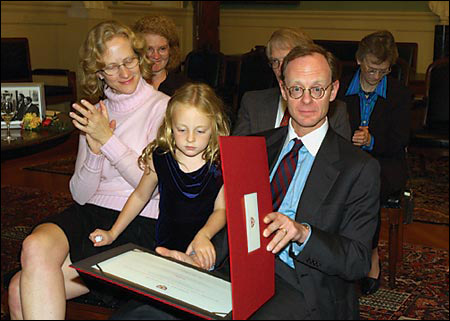
J. Christopher Flowers and Mary H. White
Chris Flowers ’79 learned about the importance of education from both of his parents; his father, the late Woodford L. Flowers M.B.A. ’52, further instilled a respect for those who teach. His mother, Ann A. Flowers, was a librarian, and his father was administrative director of various programs at Harvard Business School from 1964 to 1976. As an expression of his gratitude toward his parents, Flowers and his wife, Mary White, established the Woodford L. and Ann A. Flowers University Professorship in their honor in 2003. Three years later, Flowers and White have again stepped forward to help. “My parents’ example guided me in gaining great admiration for the importance of education and educators,” said Flowers. “In giving to the Professorship Challenge Fund, Mary and I hope to encourage donors who value the transformative nature of teaching and learning to invest in Harvard’s faculty.”
Both parents encouraged Flowers to attend Harvard. After graduation, he joined Goldman Sachs, where he headed the firm’s financial institutions group. Under his direction, the group became a top financial institution on Wall Street. Flowers now invests in banks and insurance companies, including, most notably, Shinsei Bank of Japan. An active alumnus, Flowers sits on the Committee on University Resources and the FAS Dean’s Council, and co-chairs the New York Major Gifts Committee. He has served as a Harvard College Fund class co-chair since 1998, beginning with 1979’s 20th Reunion Gift Committee and continuing as part of the class leadership through its 25th reunion campaign.
Mary White graduated from Wellesley College and worked as a physician and infectious disease specialist at Sloan-Kettering Cancer Institute. She stopped practicing in 1998 to focus on her daughters and volunteer roles. White and Flowers are actively involved in several philanthropies. Through St. James Church in New York, White assists a program in Haiti that focuses on education and health needs. She also serves on the board of Spence-Chapin, an adoption agency based in New York City, and Union Theological Seminary.
James F. and Anne Fitzpatrick Rothenberg
When Jim Rothenberg ’68, M.B.A. ’70 and his wife, Anne, established two humanities professorships (in 1999 and 2002), they felt it was an effective way of giving back to the system and the society from which they had both benefited. Now the Rothenbergs have decided to amplify their aid. “Educating Harvard’s talented students contributes so much to the future of our society,” said Rothenberg. “Knowing that our commitment could inspire others to give to such an important priority was a great motivation for us.”
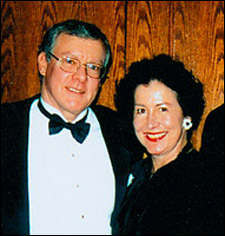
Anne Rothenberg began at Connecticut College but received her B.A. from Boston University with a focus on the classics. Active in Pasadena civic causes, she has chaired the Pasadena Showcase House for the Arts and also serves as a trustee of the Huntington Library, Art Collections, and Botanical Gardens in San Marino, Calif.
A prominent figure in the investment world, Jim Rothenberg has served as the University’s treasurer since 2004. He maintains an active presence in Harvard alumni affairs and is a member of the Dean’s Advisory Councils of both the FAS and the Business School, as well as the Committee on University Resources.
Rothenberg, a native of Pittsburgh, concentrated in English while at the College. He went on to receive his M.B.A. from Harvard Business School in 1970. An engaged leader among Harvard alumni on the West Coast, he has also co-chaired his 30th and 35th College reunions.
Since 1994, he has served as president and as a director of Capital Research and Management Co., a principal subsidiary of the Capital Group Companies and the investment adviser to the American Funds. He is also president of The Investment Company of America, vice chairman of The Growth Fund of America and Fundamental Investors, and a director of the Capital Group. A chartered financial analyst, he has worked within the Capital organization since 1970. Rothenberg was a governor of the National Association of Securities Dealers from 1996 to 2002 and a member of the board of directors of NASDAQ from 1996 to 1999.
The Rothenbergs have three children, Catherine (Vassar), Erin (Stanford), and Daniel ’04.
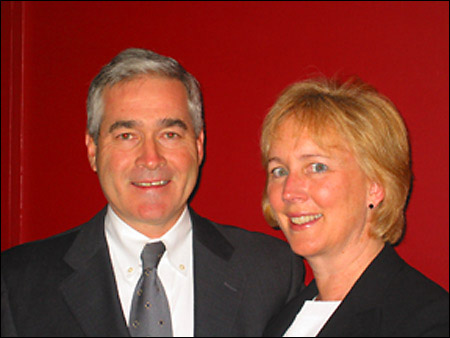
Brian D. and Anne T. Young
For Brian Young ’76, concentrating in philosophy was a remarkable preparation for life, teaching him to challenge conventional wisdom and reflect on issues in the broadest context possible. Wanting to give back to Harvard and to a department that had such an enormous effect on both his undergraduate experience and his life since that time, Young endowed a professorship in philosophy in 2001. Supporting the Professorship Challenge Fund struck him as a natural next step. Young described his undergraduate years in the philosophy department as “fascinating,” offering him a front-row seat to the philosophical debates among faculty members such as the late John Rawls, James B. Conant University Professor, and the late Robert Nozick, Pellegrino University Professor. “They waged their debates in both their writings and the courses they taught. I took courses from both of them and Professor Rawls was my thesis adviser. It was probably the most interesting philosophical debate going on in the world at the time and it was happening in one Harvard department,” said Young. “I hope the Challenge Fund will encourage donors to endow a chair and make the same experience possible for future generations.”
Young grew up in Wellesley, Mass., and attended Wellesley High School before coming to the College. He later co-founded the New York investment firm Eos Partners, L.P. He was previously a general partner and co-head of the private investment business at Odyssey Partners, L.P. Young also served as managing director of First Boston Corp., where he helped build the mergers and acquisitions group and headed the firm’s leveraged buyout department. First serving as a class co-chair for his 15th reunion, Young has filled that role ever since. He has continued his leadership as a member of COUR and the New York Major Gifts Committee. He is also co-chair of the FAS Task Force on Academic Resources.




